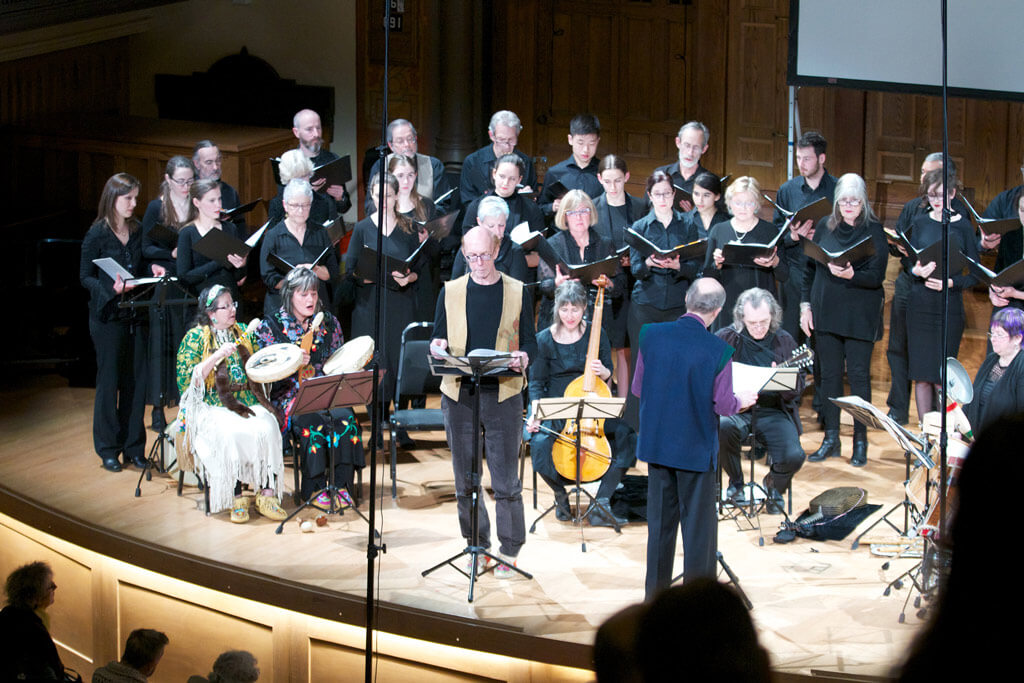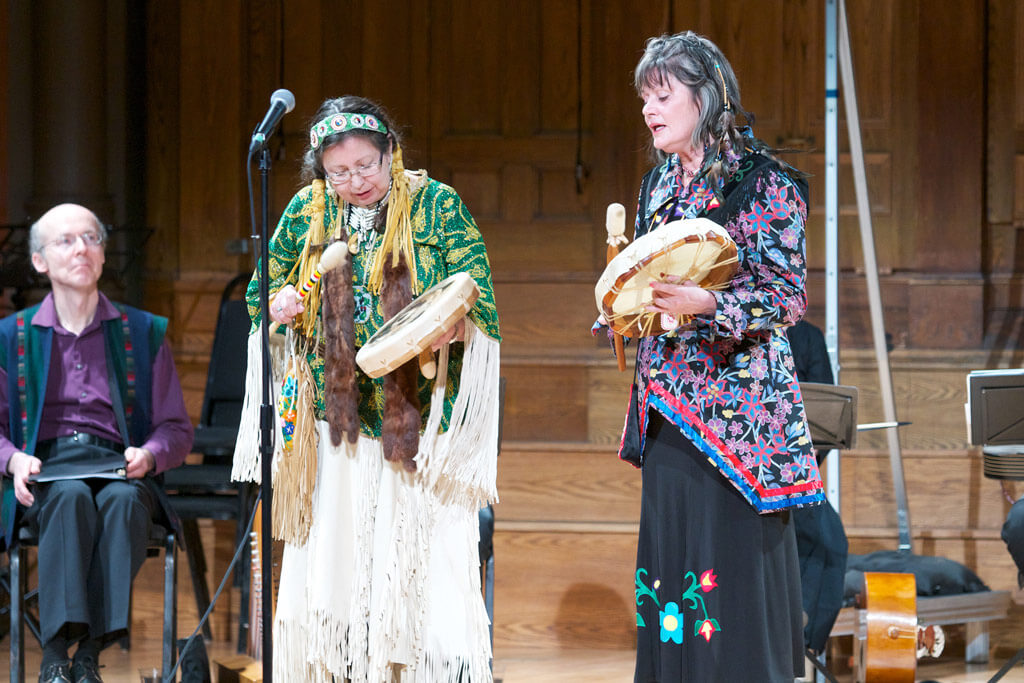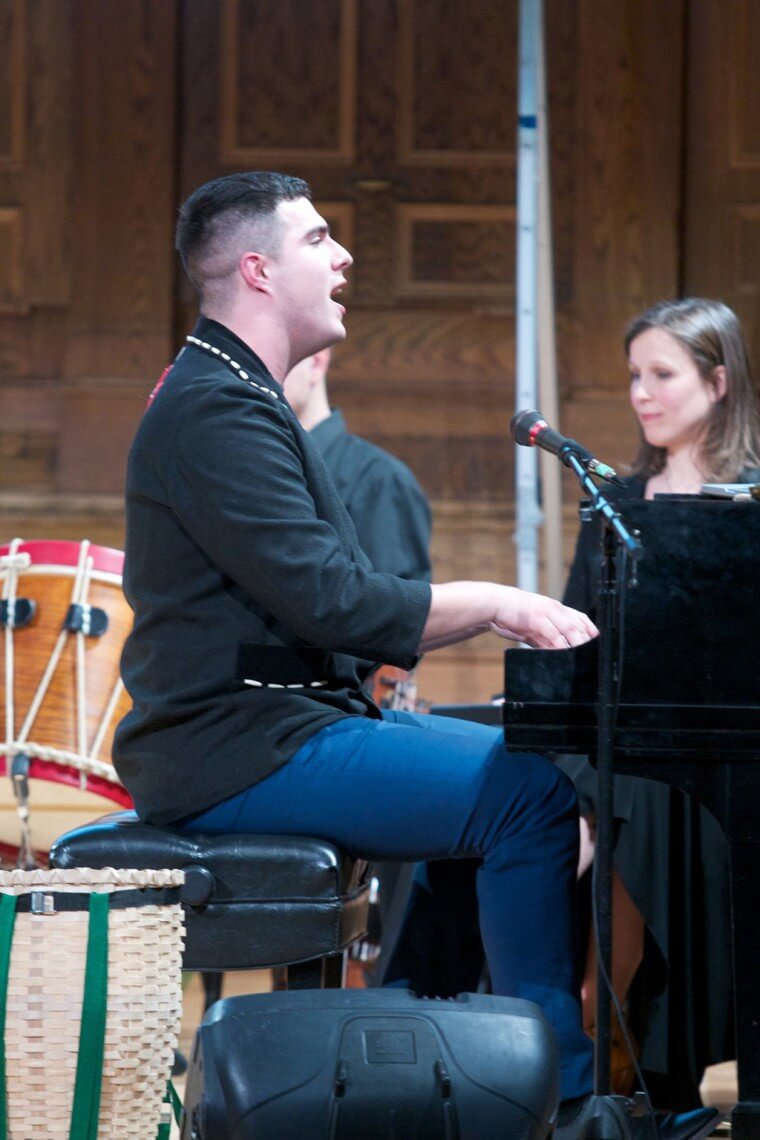
The Toronto Consort, Kanatha/Canada: First Encounters. At Jeanne Lamon Hall, Trinity-St Paul’s Centre. Friday.
The 150th “Birthday” celebrations for Canada’s Sesquicentennial make me uncomfortable. I think the occasion makes a lot of people uncomfortable. To celebrate 150 years of the country sort of eliminates and denigrates the complex and detailed history of the peoples that have inhabited this part of the Earth for millennia before Confederation in 1867. Colonization is a complex process that continues to affect and shape the Canada we know, and not all of it is fanfare for the Monarchy.
What these 150th celebrations do allow is a unique time and place to have some difficult conversations about what it means to be Canadian, who is Canadian, and who has been erased as Canadian. I believe music can be a media to have that discussion, and the Toronto Consort with guests, have shown us how we might do so; how we might reclaim, create, and educate.
This is an incredibly unusual program. One doesn’t usually associate early music with Canada, or the Canadian experience, but Europeans were here from the 16th-century at the same time Claudio Monteverdi and Gregorio Allegri were writing their masterpieces. Indigenous music traditions, also part of this concert experience, were firmly established by this point.
The Toronto Consort provided a nice reminder of what sounds, and fun would have entertained those early settlers: the viola de gamba, harp, hurdy-gurdy, organ, drum, lute, recorder, and flute. Indigenous artists Georges Sioui, Marilyn George, Shirley Hay, and Jeremy Dutcher joined the Consort for this performance.

The first half was focused on the events of the “Great Peace” of Montreal. A real event in 1701, it marked the gathering to negotiate and sign a peace accord of 1300 delegates from all around the Great Lakes to the Maritimes representing 39 different nations along with the Roman Catholic Church and French settlers. Using a collection of period instruments, there are several folk songs that help set the tone: “Renaud”, “La belle a pris l’épée”, and “Ornate Aras”. It’s all very inviting and effective at bringing the audience into a different world. The musicianship is impeccable, moreover, the Toronto Consort present as an ensemble that truly like performing with each other.
Throughout this, Hay and George provided songs set to drums. The iconic performance of the evening is firmly Jeremy Dutcher. An artist from the Wolastoq (Maliseet) Nation, Dutcher provides a compelling metaphor for the idea of a “conversation”. He is exploring his ancestry, creating new music, and recording history in the process of performance. Playing snippets of wax cylinder recordings from the turn of the century, his performance rises from these relics, his voice and composition bring new energy to something rich and heavy. To view this process is to watch him have an intimate conversation. Three times he performs in the first act, all selections from his work “Wolastoqiyuk Lintuwakonawa”: “Lintuwakon ciw Oquiton (Song of the Canoe)”, “Lintuwakon ciw Mehcinut (Death Chant)”, and “Lintowakon ciw Esuwonikahattitit (Trading song)”.

Jeremy Dutcher draws listeners in with his vibrant and charismatic voice matched by his humble demeanour. His enormous ability to invoke, invite, and tell a story is incredibly seductive. Listening to his voice work through his compositions, deeply rooted in a personal and collective history, I find myself as a child, sitting at his feet, excitedly imagining his stories brought to life. At other times, I imagine myself being consoled, my head resting on his lap. Such is the power of his voice and presence, to take you intimately inwards and leave you changed. Jeremy Dutcher is magic — deep magic.
The second half of the concert was John Beckwith’s creation “Wendake/Huronia”. A series of 6 moments throughout history, the work is described by Beckwith as a “choral documentary for choir, alto soloist, narrator, and an early-instrument ensemble including First Nations drums”. For this work, the Toronto Consort was joined by Georges Sioui as narrator, Marilyn George and Shirley Hay on drums, and the Toronto Chamber Choir joined by singers from the Brookside Music Association. The combined forces were effective storytellers under David Fallis’s leadership.
The Beckwith also leads us to the conversations we still need to have. His inclusion of a hand bell creates a sound we all know, the school bell beckoning students. It is a savage and destructive sound in this context. The “black robes” (signifying the clergy) are invoked with the ringing of the bells; the shadow of residential schools continues to hold a deep darkness in need of respect and healing.
Trinity-St Paul’s Centre is a United Church. Once upon a time the constituent churches of the United Faith – Methodist, Presbyterian, and Congregationalist — were part of a system complicit in the state-sponsored, systematic elimination and destruction of Indigenous voices through residential schools. To think that we could experience a concert created by descendants of those voices is a remarkable moment of truth.
There is a role for music to play in this continued conversation as well. Especially as we encounter an entire year of superficial Sesquicentennial celebrations. The works presented this night are an example of the very difficult conversations that music is capable of conveying. So here is to creation, and just as important, listening.



